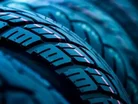Plastic with a cold grip: the innovative new plastic snow chains for tyres

Even at low temperatures plastic can efficiently substitute metal; the French textile and rubber company Joubert Productions, Ambert, is for the first time putting snow chains on the market whose chain links are made entirely from plastic. This has become possible with Elastollan®, the thermoplastic polyurethane (TPU) from BASF, and BASF’s support in optimizing the component geometry and production. The snow chains made from the two Elastollan® grades B90A15 and B60A10WH meet the ÖNORM 5117 standard, which applies across Europe, are suitable for different tire sizes, and easy to fit. The Elastollan® versions are abrasion resistant, flexible at low temperatures, and resistant to loose chippings and road salt. They thus ensure that the snow chains have optimum grip on ice and snow.
For this new plastic application, Elastollan® offers an excellent combination of lightweight construction and serial production: the conventional metal chain mesh is replaced by two Elastollan® grades of different colors that chemically adhere to one another in the injection-molding process, and so do not have to be additionally assembled. The black Elastollan® B90A15 with a harder setting displays very good mechanical properties along with great flexibility at low temperatures, while the red Elastollan® B60A10WH is more flexible and easy-flowing. In compact injection molding, the black chain links are overmolded with the red Elastollan® in one mold where they join chemically. As TPU adheres to TPU very well, there is no need for another assembly step as is necessary with metal meshes.
“Tailor-made quality products are the most important part of our business. BASF not only supported our idea of producing lightweight, easy-to-fit snow chains by providing the right material. What is crucial for us is that BASF has been with us right from the initial idea via finding the appropriate mold through to the finished product, thus enabling us to set up with an optimum production process,” says Régis Kaelin, who is responsible for R&D at Joubert. “This means we are not only able to manufacture products efficiently, but can also offer car drivers a high level of safety in winter with snow chains that can be used without any problems.”
The Austrian standard ÖNORM 5117 is designed for metallic chain links which cover the full tread of tires and must be in contact with the road surface whatever position the wheel is in. Due to the outstanding road grip of BASF’s TPU, the snow chains enable car drivers to enjoy the best possible control over their vehicles on snow-covered roads. As the Elastollan® links are much lighter than the conventional metal mesh, the snow chains are easy to handle and quick to remove.

